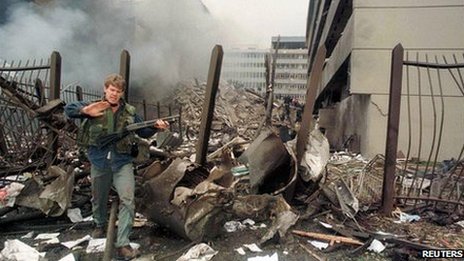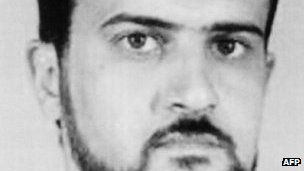A Libyan man seized earlier this month in a US raid in Tripoli has pleaded not guilty in a New York court to two US embassy bombings in 1998.

Abu Anas al-Liby, whose real name is Nazih Abdul-Hamed al-Ruqai, entered the plea through his attorney.
He is accused of links with al-Qaeda and involvement in the bombings of US embassies in Kenya and Tanzania, which killed more than 220 people.
Mr Liby, aged 49, was indicted by a New York grand jury in 2000.
‘Appropriate target’
On Tuesday, Mr Liby appeared handcuffed in New York’s federal court, which was packed with reporters.
Mr Liby, who had a bushy grey beard, listened as presiding Judge Lewis Kaplan read out the list of charges against him.
He then entered the not guilty plea, and the judge adjourned the hearing until 22 October.
The suspect was led out of the courtroom after the judge said he must be kept in detention as a flight risk.
There has been anger in Libya over the US commando raid on 5 October which seized the senior al-Qaeda suspect. Many saw the raid as a breach of Libyan sovereignty.
US Secretary of State John Kerry has defended the capture of Mr Liby, calling him a “legal and appropriate target”.
The Libyan government has demanded an explanation for the raid from the US. Its justice minister summoned the US ambassador to the country for questioning last week.

Libyan Prime Minister Ali Zeidan said Libya was “keen on prosecuting any Libyan citizen inside Libya”. Mr Zeidan was briefly held captive by militiamen several days after the raid but the motive for the abduction remains unclear.
Intelligence officials interrogated Mr Liby aboard the USS San Antonio in the Mediterranean for a week after his capture, according to reports.
Mr Liby’s sons have claimed that Libyans were involved in his kidnap, which Tripoli denies.
Most wanted
On 7 August 1998, trucks laden with explosives detonated almost simultaneously outside the US embassy in Nairobi and America’s diplomatic mission in Dar es Salaam.
More than 200 people died in the Kenyan capital and at least 11 in Dar es Salaam. Thousands of people were injured in the bombings.
The majority of the victims were civilians.
Mr Liby had been on the FBI’s most wanted list for more than a decade, with a $5m (£3.1m) bounty on his head.
The charges against him include discussing a possible al-Qaeda attack against the US embassy in the Kenyan capital, Nairobi, in retaliation for the American military intervention in Somalia.
The former computer programmer is also alleged to have carried out “visual and photographic surveillance” of the building in 1993 and “reviewed files” concerning possible attacks on Western interests in East Africa.
A second US commando raid on 5 October failed to capture its target – Abdukadir Mohamed Abdukadir, a Kenyan al-Shabab commander also known as Ikrima.
The al-Shabab militant group says it carried out last month’s attack on the Westgate shopping centre in Nairobi, which left at least 67 people dead.




